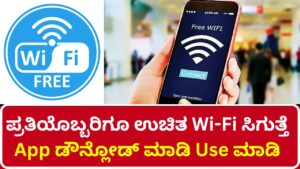Free Wi-Fi : ಪ್ರತಿಯೊಬ್ಬರಿಗೂ ಉಚಿತ Wi-Fi ಸಿಗುತ್ತೆ App ಡೌನ್ಲೋಡ್ ಮಾಡಿ Use ಮಾಡಿ
In today’s digital age, the availability of free Wi-Fi has become almost ubiquitous. Whether you’re in a coffee shop, airport, or hotel, accessing free Wi-Fi can be a convenient way to stay connected. However, using public Wi-Fi networks comes with its own set of benefits and risks. This article delves into how you can safely use free Wi-Fi and the precautions you should take.

What Is Free Wi-Fi?
Free Wi-Fi refers to wireless internet access provided at no charge to users in public places. These networks are typically open and do not require a password for access. They are convenient for people who need to access the internet on the go without using their mobile data.
The Benefits of Free Wi-Fi
1. Convenience
Free Wi-Fi offers incredible convenience, allowing you to connect to the internet without using up your mobile data. This is especially helpful for travelers or those who spend a lot of time in public places.
2. Cost Savings
By using free Wi-Fi, you can save money on data usage, especially if you have a limited data plan. This can be a significant benefit for those who need to stay connected but want to avoid data overage charges.
3. Accessibility
Free Wi-Fi can help bridge the digital divide by providing internet access to people who might not otherwise afford it. This accessibility can be crucial for students, job seekers, and those needing to stay informed.
The Risks of Using Free Wi-Fi
1. Security Vulnerabilities
Public Wi-Fi networks are often unsecured, making them vulnerable to hacking and other cyber threats. Without proper security measures, your personal information, such as passwords and credit card numbers, could be at risk.
2. Man-in-the-Middle Attacks
One of the most common threats on free Wi-Fi networks is a man-in-the-middle attack. This occurs when a hacker intercepts the communication between your device and the Wi-Fi network, potentially stealing your data.
3. Data Snooping
On unsecured Wi-Fi networks, it’s possible for someone to monitor the data being transmitted between your device and the network. This can include sensitive information like emails, login credentials, and more.
Best Practices for Safe Free Wi-Fi Use
1. Use a VPN
Using a VPN is one of the most effective ways to secure your connection on a public Wi-Fi network.
2. Avoid Sensitive Transactions
When connected to a free Wi-Fi network, avoid conducting sensitive activities such as online banking or shopping. If you must access these sites, make sure they use HTTPS, which indicates that the connection is secure.
3. Turn Off Sharing
Ensure that sharing features like file sharing or AirDrop are turned off on your device when connected to a public Wi-Fi network.
4. Keep Your Software Updated
Ensure your operating system, antivirus software, and other applications are up-to-date before connecting to a public Wi-Fi network.
5. Forget the Network After Use
After using a public Wi-Fi network, it’s a good idea to forget the network so your device doesn’t automatically reconnect to it in the future. This can help reduce the risk of accidentally connecting to a malicious network.
Conclusion
While free Wi-Fi is a convenient and cost-effective way to stay connected, it’s important to be aware of the potential risks. By following best practices such as using a VPN, avoiding sensitive transactions, and keeping your software updated, you can minimize these risks and use free Wi-Fi more safely.
